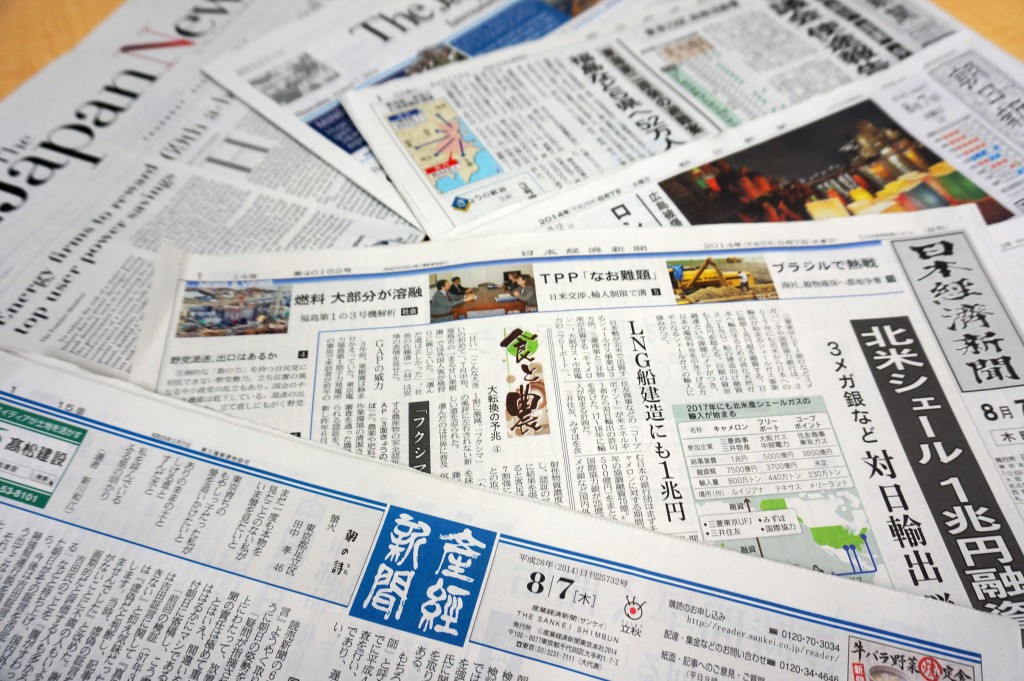A summary of editorials from leading Japanese newspapers (March 6, 2015)
A summary of editorials from leading Japanese newspapers, posted biweekly.
A 16-member advisory panel on a statement to be made by Prime Minister Shinzo Abe on the 70th anniversary of the end of World War II held its first meeting on Feb. 25, launching discussions on how his statement should describe Japan’s reflection on its past, the post-war path it walked as a pacifist nation and the roles it will play in the international community.
A report to be submitted by the panel this summer will be used as a reference when the government considers how the prime minister’s remarks should be worded.
The Asahi Shimbun, The Nihon Keizai Shimbun (Nikkei) and The Yomiuri Shimbun wrote about the subject on Feb. 26, while The Mainichi Shimbun and The Sankei Shimbun wrote about it on the following day. The most controversial issue among the newspapers was whether to keep the expressions of remorse and apology for Japan’s colonial rule and aggression, which were included in a statement made by then Prime Minister Tomiichi Murayama on the 50th anniversary of the war’s end.
‘Carry on Murayama statement’
The Nikkei said it was essential for Abe not to sow misgivings among people at home and abroad about Japan’s perception on its past conducts, saying the statement should not be used “to express his own personal feelings.”
The conservative camp—Abe’s support base—often criticizes the “deep remorse” and “heartfelt apology” stated in the Murayama statement, which it blasts as a “self-tormenting” historical perception, The Nikkei said. “Considering Japan’s past conduct, however, these expressions should not be taken as having gone too far.”
The economic daily also commented: “The Abe statement will not only have a major impact on relations with China, South Korea and other neighboring countries. If Japan is viewed as a historical revisionist that denies the post-war international order, it could impair the country’s relations with the United States.”
The Asahi said Abe has a “history of voicing skeptical views” about the Murayama statement, adding that the prime minister has yet to clarify his views on such core elements of the statement as the “mistaken national policy” taken by Japan and “colonial rule and aggression.”
“If Abe’s aim in issuing a new statement is to downplay the importance of such key expressions as colonial rule and aggression together with the entire Murayama statement, despite his pledge to carry on the document’s overall message, he should not put one out,” The Asahi said. “Such an intention would be immediately detected and interpreted by the world as an attempt by Japan to shut its eyes to the past.”
The Mainichi, meanwhile, extensively discussed one of the five points to be included in the statement: What lessons Japan should learn from its experiences in the 20th century.
If the advisory panel sums up discussions under this theme, “Japan’s colonial rule of the Korean Peninsula and invasion of China would be relativized as a form of imperialism and lessons that should be learned from Japan’s past aggressive policies could be obscured,” The Mainichi said.
“If lessons from the 20th century were to be described in order to water down the historical perception in the Murayama statement, Abe’s statement would draw unnecessary protests rather than help strengthen Japan’s position in the international community.”
‘Ill-effects of Murayama statement’
The Sankei denounced the Murayama statement for unilaterally making Japan’s apology over its colonial rule and aggression, which it said caused tremendous ill-effects on Japan’s diplomacy. Since the statement was issued, Cabinet ministers and government officials have met strong condemnation for making remarks that ran counter with it, despite apparent defects in its content and the procedures to gain Cabinet approval, The Sankei said. “These domestic circumstances led China and South Korea to use ‘historical issues’ as an effective diplomatic trump card against Japan,” it said.
The Sankei went further, saying Japan should no longer carry on the Murayama statement, which imposes a “self-tormenting” historical view on Japanese people emphasizing only the negative sides of the past and makes them—old and young alike—shrink and falter.
‘Essential to issue new statement’
The Yomiuri Shimbun hailed Abe’s intention to issue a statement on this occasion, saying: “To win the understanding of the international community, it is important for a future-oriented statement to properly take into account this nation’s remorse regarding its conduct before and during the war and the path it followed in the postwar years.”
The Yomiuri stopped short of commenting on the advisability of carrying on the Murayama statement and merely stated that the international environment surrounding Japan has greatly changed since the Murayama statement was released. “China has gained power both economically and militarily, reinforcing its international influence,” it said. “Regarding the Senkaku Islands in Okinawa Prefecture and differences in historical perceptions, bilateral antagonism has escalated between Japan and China. And bilateral relations between Japan and South Korea have become chilly over such issues as the so-called comfort women.”
With China set to release extensive anti-Japan propaganda this year, “Abe needs to respond in a level-headed manner and strategically,” The Yomiuri said.
*English translations of The Yomiuri, The Asahi, and The Mainichi are from The Japan News, The Asia & Japan Watch and The Mainichi, respectively. Those for The Sankei and The Nikkei are provisional. The content of this page was made by the Foreign Press Center/Japan and does not reflect the opinion of the Japanese Government or any other organization.



